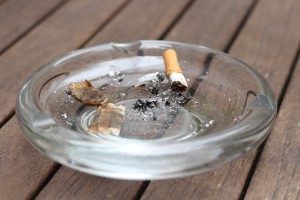Dentist Near Me

If you have crooked teeth, you may already be looking into orthodontic solutions to improve your smile. However, did you know straightening your teeth can have benefits beyond increased confidence?
Many people may not realize it, but your oral health plays a large role in your body’s overall health. Poor oral health can put you at a much higher risk of stroke, heart disease, illness, miscarriages, and more. Crooked teeth can impede your ability to take proper care of your mouth, putting you at an increased risk of any number of ailments. Below are some of the most common issues exacerbated by crooked teeth. If you are experiencing any of these issues, contact our office today to see how orthodontic care can offer relief.
Gum Disease
Crooked teeth can often be much harder to properly clean than straight teeth. Without regular brushing and flossing, your chance of developing gum disease increases significantly. An untreated buildup of plaque can lead to gingivitis and periodontal disease, the leading cause of tooth loss among adults. Swollen and irritated gums can open the door for bacteria to enter your blood stream and trigger inflammation elsewhere in your body and increase your risk of stroke, heart disease, and more.
It’s important for everyone to maintain a proper oral care routine and visit their dentist at least twice annually for cleanings and examinations. However, even that may not be enough if your teeth are too crooked to properly clean. We offer a variety of orthodontic solutions to help correct misaligned teeth and make it easier for you to take care of your smile. Visit our office today to learn more!
TMD/TMJ Pain
Crooked teeth or an improper bite may increase your risk of developing temporomandibular joint disorder (TMD). While the most common cause of TMD is the clenching and grinding of teeth, a misaligned bite may be a contributing factor. TMD can cause soreness and discomfort in the jaw, clicking sounds while chewing, headaches, and other facial pain.
If you have been experiencing jaw pain, an evaluation may help you determine if treatment for TMD is necessary. Correcting a misaligned bite can go a long way in alleviating some of the discomfort caused by TMD.
Enamel Erosion
Enamel is the thin, tough shell coating the outside of your teeth that protects them from damage and wear. Though a variety of environmental factors can lead to enamel loss, teeth grinding is another common cause. When your teeth are crooked and your bite does not properly align, the simple acts of speaking and chewing can cause your teeth to grind against each other. When left untreated, this can contribute a degradation in your enamel.
A loss in enamel can lead to tooth discoloration, increased pain and sensitivity, and cracks and chips forming in your teeth. There is a lot you can do at home to protect your enamel, including drinking plenty of water, avoiding excessively acidic or sugary foods, and brushing and flossing regularly. However, your crooked teeth may limit your ability to prevent enamel erosion on your own. Contact our office today to see if orthodontic treatment could be the solution you need.
Existing Patients: (703) 281-0902
New Patients: (703) 672-5305
Emergency: (571) 306-2075
Office Address: 2563 Chain Bridge Rd. Vienna, VA 22181



 Do your children constantly ask for sugary snacks that you know are not good for their health? There are healthy alternatives to the junk food your child loves that taste just as great. Here are a few options to get you started.
Do your children constantly ask for sugary snacks that you know are not good for their health? There are healthy alternatives to the junk food your child loves that taste just as great. Here are a few options to get you started. When you are close to someone you can often be overly comfortable in sharing. This is especially true with kissing. In one kiss, more than 500 germs can be shared between two people. Sharing a kiss can have an impact on your oral health. Here are some of the dangers of kissing.
When you are close to someone you can often be overly comfortable in sharing. This is especially true with kissing. In one kiss, more than 500 germs can be shared between two people. Sharing a kiss can have an impact on your oral health. Here are some of the dangers of kissing. Your teeth age with you. It’s important to keep them strong and healthy even as you grow older. Seniors are at a higher risk for developing periodontal disease. In addition to getting a regular dental examination, here are some other tips to keep your teeth healthy.
Your teeth age with you. It’s important to keep them strong and healthy even as you grow older. Seniors are at a higher risk for developing periodontal disease. In addition to getting a regular dental examination, here are some other tips to keep your teeth healthy. In addition to brushing your teeth twice each day and flossing at least once, it is also important to take good care of your tongue. Bacteria can build up on your tongue throughout the day. For some patients, using a tongue scraper can be the best solution for a cleaner, healthier tongue.
In addition to brushing your teeth twice each day and flossing at least once, it is also important to take good care of your tongue. Bacteria can build up on your tongue throughout the day. For some patients, using a tongue scraper can be the best solution for a cleaner, healthier tongue. The internet is fraught with myths about everything. In this “information age” you might think it would be easy to find the truth, but that’s not always the case. Dentistry is no different. It’s no surprise that dental myths are abundant, especially in regard to some of the more intimidating procedures. However, advancements in dental technology have made it possible to receive the advanced care you need with little to no discomfort. Here are some common myths you might hear about root canals debunked. Contact our dental office to learn more.
The internet is fraught with myths about everything. In this “information age” you might think it would be easy to find the truth, but that’s not always the case. Dentistry is no different. It’s no surprise that dental myths are abundant, especially in regard to some of the more intimidating procedures. However, advancements in dental technology have made it possible to receive the advanced care you need with little to no discomfort. Here are some common myths you might hear about root canals debunked. Contact our dental office to learn more. Cosmetic dentistry has been around for ages. We’ve noticed that now, more than ever, people are concerned with overall wellness in addition to a beautiful smile. In past years, we had many patients come to us seeking whitening and seeming unconcerned with ridding their smile of infection and decay.
Cosmetic dentistry has been around for ages. We’ve noticed that now, more than ever, people are concerned with overall wellness in addition to a beautiful smile. In past years, we had many patients come to us seeking whitening and seeming unconcerned with ridding their smile of infection and decay. Coffee is well-known as hazardous to teeth, but there are things you can do besides cut it out completely. Here are some things to know about coffee’s effects on your oral health and diet, as well as how to mitigate them.
Coffee is well-known as hazardous to teeth, but there are things you can do besides cut it out completely. Here are some things to know about coffee’s effects on your oral health and diet, as well as how to mitigate them.